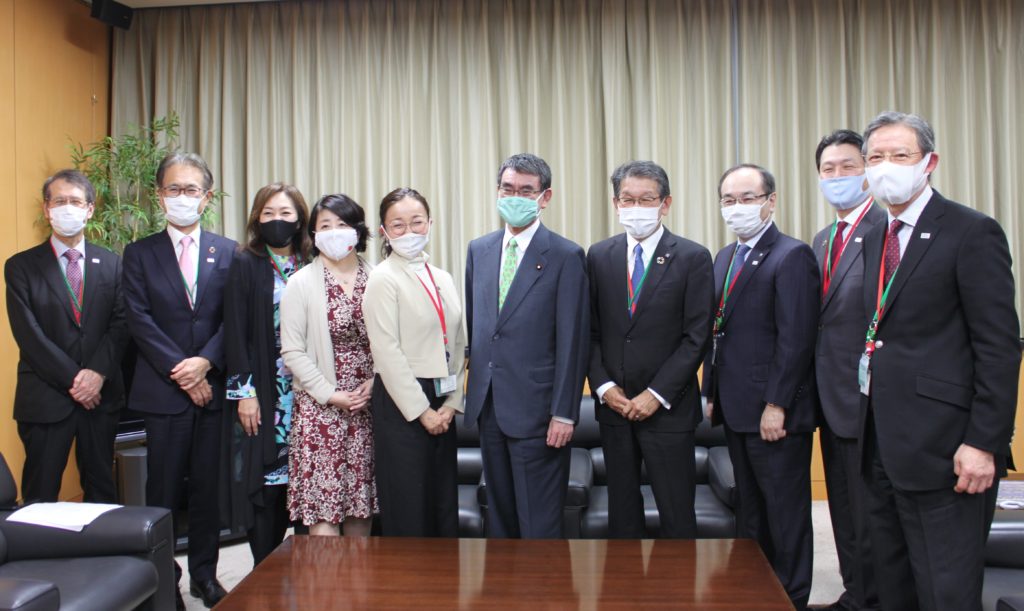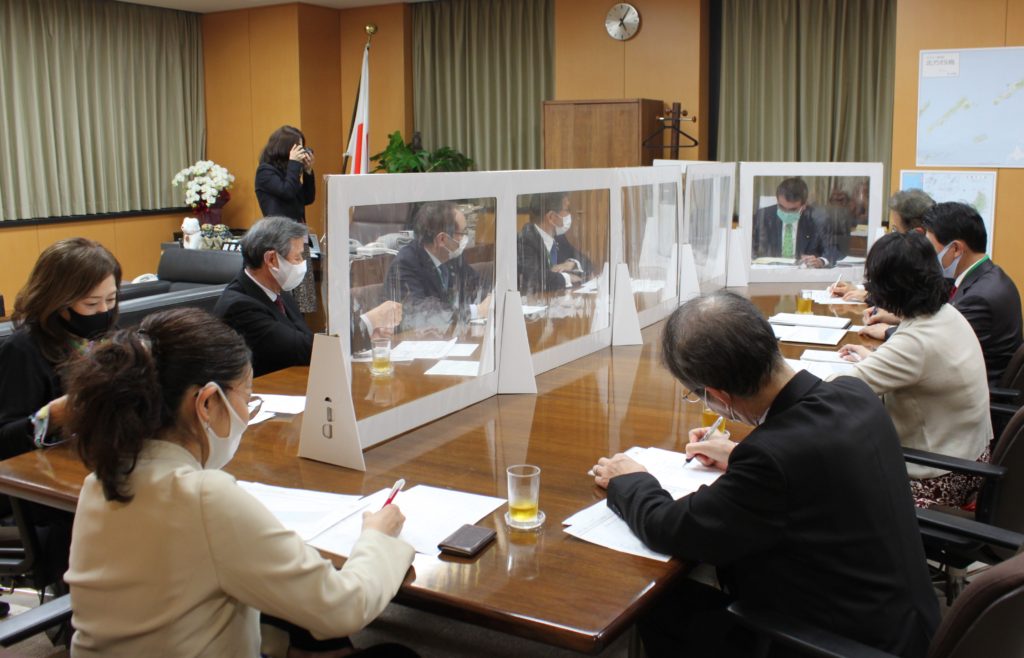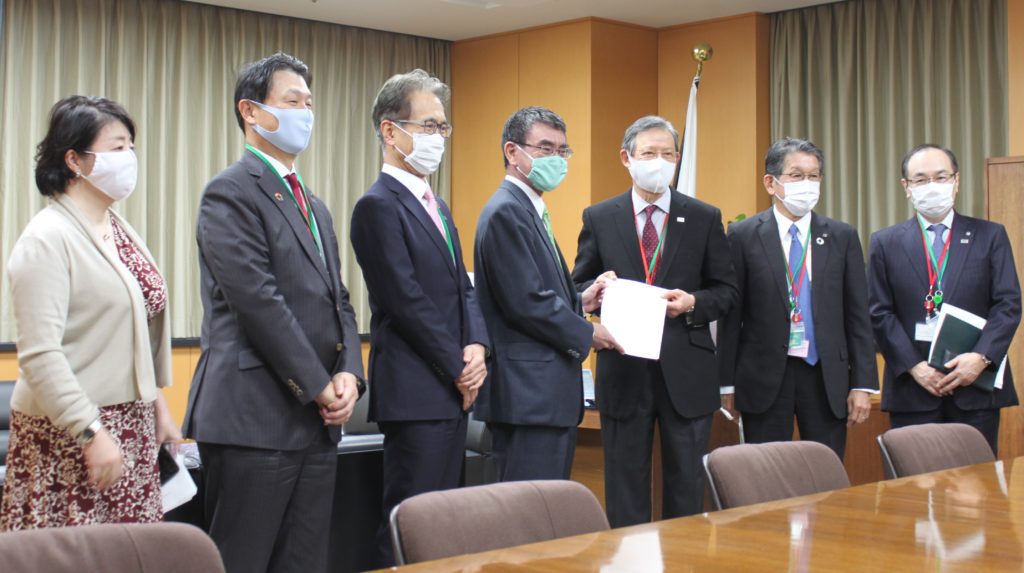
On Wednesday, November 18, 2020, four CEOs (including the incoming CEO) of member companies of the Japan Climate Initiative (JCI) (Nissay Asset Management, Kao, Ricoh, and Sony) had a meeting with Taro Kono, Minister for Administrative Reform & Regulatory Reform to exchange opinions on regulatory reforms aimed at expanding renewable energy. In addition, Takejiro Sueyoshi, JCI Representative, handed Minister Kono a proposal for regulatory reform on renewable energy expansion.
At the beginning of the meeting, Minister Kono stated, “Now that the Prime Minister has declared carbon neutral by 2050, there is no time to spare in making renewable power the main power source. Based on the request from the industry for regulatory reform on renewable energy, we will do everything the government can do”. In response to this statement, the CEOs of the four companies made comments on their efforts and requests to the government.
In the CEOs comments, it was reported that among the company’s global bases, about half of the energy source at European location have already been switched to renewable energy, but in Japan, they cannot procure renewable source as expected and it remained in the 1% range. In addition, a serious example in which delays in renewable energy supply in Japan is that while a buyer of their main products required them to manufacture the products with 100% renewable energy by 2030, only limited renewable energy supply in the factory location area are available for use.
On the other hand, it was also stated that if Japanese companies work together, it will be possible to accelerate the development of new technologies for decarbonization. In addition, it has been pointed out that the risk for investing in renewable energy can be reduced with clear indication of Japanese government’s long-term direction of energy policy and requested the country’s energy mix target of renewable energy by 2030 to be set at 40% or more..
In response to the remarks of the four companies, Minister Kono said, “It is easy to get opinions from the existing energy industry that renewable energy is unstable or that it is impossible to increase it. Even among experts, some of them still have opinions remains on understanding of 5 years or 10 years ago. I would like everyone at the industry to convey us the actual situation with needs of renewable energy in business field”.
Finally, the JCI secretariat organizations introduced their future efforts, and all agreed to continue cooperation at the end of the meeting.
■ Meeting date and place:
16: 30-17: 10 JST, Wednesday, November 18, 2020
Minister Kono’s Office in the Cabinet Office
■ Participants:
JCI member companies (in alphabetical order)
Hiroshi OZEKI, President and Chief Executive Officer, Nissay Asset Management Corporation
Yoshihiro Hasebe Representative Director, Senior Managing Executive Officer, Kao Corporation (Representative Director, President and CEO from January 1, 2021)
Yoshinori Yamashita, President and CEO, Ricoh Company, Ltd.
Kenichiro Yoshida, Chairman, President and CEO, Representative Corporate Executive Officer, Sony Corporation
JCI Representative / Secretariat
Takejiro Sueyoshi, JCI Representative, Special Advisor to the United Nations Environment Program Finance Initiative
Teruyuki Ohno, Executive Director, Renewable Energy Institute
Mika Ohbayashi, Director, Renewable Energy Institute
Michiyo Morisawa, Director, CDP Worldwide-Japan
Kae Takase, Senior Manager, CDP Worldwide-Japan
Ken Tanaka, Climate and Energy Group, WWF Japan

PDF: Regulatory reforms on renewable energy -Proposal from the Japan Climate Initiative (JCI)-
(provisional translation)
(Provisional Translation)
Regulatory reforms on renewable energy
-Proposal from the Japan Climate Initiative (JCI)-
The following is the JCI’s first proposal of regulatory reform on renewable energy. In the future, we will collect the opinions of JCI members and make the proposal more concrete.
1. Reforms to make funding flow into renewable energy development
①The government should set a long-term high renewable energy target and create an environment where companies and investors can make investment in renewable energy at ease.
②In order to induce the assets of pension funds to ESG investment regardless of public or private, the government should introduce a mechanism in which all pension funds report whether or not they are implementing ESG investment, and if “No”, disclose the reason etc.
2. Reforms to make it easier to supply renewable energy
③Deregulation on renewable energy development
‐ Reform the operation of the Agricultural Land Act and the Act for Improvement of Agricultural Promotion Areas so that abandoned farmland can be used effectively
– Relax the requirements for exemption from the agricultural developing area and approval of the diversion of agricultural land to enable effective use of land.
– Review research and development restrictions on renewable energy in national forests and protected forests.
– Position wind power generation facilities as public facilities.
– Speed up environmental assessment procedures.
④Regulatory reform regarding the connection of renewable energy to the electric power grid
‐ Report and disclose the usage record of the main transmission line.
– Reform for more rational connection management, including existing power sources.
– Enforce the merit order to set a rule of preferential connection of power with the lowest marginal cost.
3. Reforms needed to ensure credible and reliable renewable procurement
⑤Reform non-fossil certificate scheme to enable credible and reliable attribute tracking scheme in line with global standards.
– Reform current non-fossil certificate scheme, where certificates only convey information around the quarter of generation, to the one where all relevant attributes such as exact power source and region can be tracked. It is also important to make the scheme transparent and under credible and reliable governance scheme.
⑥Enable PPA (Power Purchase Agreement) between consumers and power generation companies
‐ Reform regulations to allow companies as consumers to directly conclude power purchase agreements (PPAs) with power generation companies, which increases companies procurement options, and makes it easier to purchase renewable electricity that meets their required conditions.
18th November, 2020
